广州版五年级英语笔记
广州版小学五年级英语知识点总结教学内容

五年级上册知识点Module1 Routines and Dates学习重点1、掌握一月到十二月、四季的名称2、用英语说出日期日期的表示法有两种,如:“今天10月20日。
”先说月份:Today is October the twentieth (20th)先说日期:Today is the twentieth of October(20th)掌握节日的名称及日期。
(详见书本第13页)例如:New Year's Day( January 1st ) Women's Day( March 8th)4、能用英语说出学期的开始和结束The autumn term begins in September and ends in January.5. 掌握基数词和序数词,注意区分和运用重点掌握:first,second,third,fifth,ninth,twelfth,twentieth.基数词表示数量:three pandas三只熊猫。
序数词表示顺序:the second month第二个月6、注意表示时间频率的词:never、sometimes、often、usually、always,注意这些词在句子中的位置——除了“是”动词以外,他们都放在在动词的前面,如:(1)She often comes here . (2)She is always late .7、能用英语谈论日常的活动(能写一篇小作文)8、掌握时态:一般现在时的使用:(1)定义:一般现在时表示已形成习惯、规律的动作或状态。
(2)特征:通常句子中有often、usually、或sometimes等等。
(3)肯定句的结构:人称+动词:①其他人称(I、you、we、they、the boys……)+动词原形②第三人称单数(he、she、it、Tom、……)+动词“s/es”形式例句:The boys like TV plays. Sally likes TV plays.(4)一般疑问句:助动词(Do/Does)+人称+动词原形Do the boys like TV plays? Does the boy like TV plays?(5)否定句:人称+助动词否定形词(don’t/doesn’t)+动词原形The boys don’t like TV plays. The boy doesn’t like TV plays.(6)记住:助动词一出,后面动词用原形。
教科版(广州)小学英语五年级上册模块重点归纳
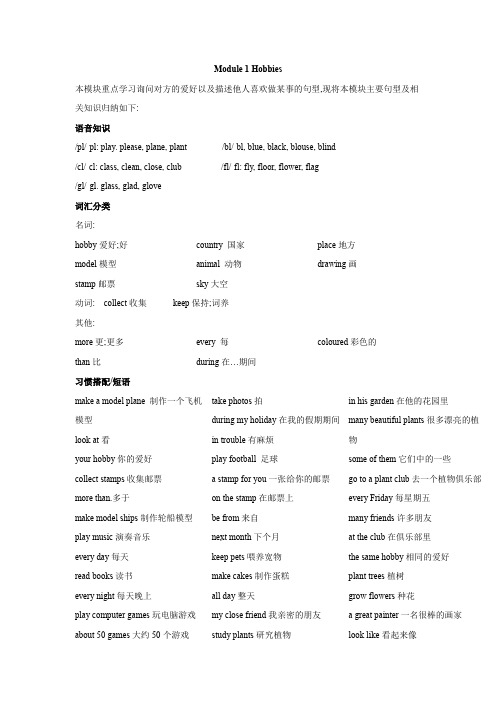
Module 1 Hobbies本模块重点学习询问对方的爱好以及描述他人喜欢做某事的句型,现将本模块主要句型及相关知识归纳如下:语音知识/pl/-pl: play. please, plane, plant /bl/-bl, blue, black, blouse, blind/cl/-cl: class, clean, close, club /fl/-fl: fly, floor, flower, flag/gl/-gl. glass, glad, glove词汇分类名词:hobby爱好;好model模型stamp邮票country 国家animal 动物sky大空place地方drawing画动词: collect收集keep保持;词养其他:more更;更多than比every 每during在…期间coloured彩色的习惯搭配/短语make a model plane 制作一个飞机模型look at看your hobby你的爱好collect stamps收集邮票more than.多于make model ships制作轮船模型play music演奏音乐every day每天read books读书every night每天晚上play computer games玩电脑游戏about 50 games大约50个游戏take photos拍during my holiday在我的假期期间in trouble有麻烦play football 足球a stamp for you一张给你的邮票on the stamp在邮票上be from来自next month下个月keep pets喂养宽物make cakes制作蛋糕all day整天my close friend我亲密的朋友study plants研究植物in his garden在他的花园里many beautiful plants很多漂亮的植物some of them它们中的一些go to a plant club去一个植物俱乐部every Friday每星期五many friends许多朋友at the club在俱乐部里the same hobby相同的爱好plant trees植树grow flowers种花a great painter一名很棒的画家look like看起来像draw cartoons画漫画draw animals画动物after school放学后in the sky在天空中birthday cards生日卡片beautiful places美丽的地方in every room在每一个房间里in her house在她家grow up长大write stories写故事play table tennis打乒乓球do some reading阅读very much很;非常put…on..把……放在…上in his bedroom在他的卧室里in the bag在袋子里as a hobby作为一项爱好惯用表达式Wow!哇! Thank you very much,非常感谢你。
广州版小学五年级英语知识点总结

广州版小学五年级英语知识点总结五年级上册共六个模块,18单元,209单词(四年级186个单词)五年级下册共六个模块,18单元,157单词(四年级172个单词)五年级上册知识点Module1 Routines and Dates学习重点1、掌握一月到十二月、四季的名称2、用英语说出日期日期的表示法有两种,如:“今天10月20日。
”a)先说月份:Today is October the twentieth (20th)b)先说日期:Today is the twentieth of October(20th)1、掌握节日的名称及日期。
(详见书本第13页)例如:New Year's Day( January 1st ) Women's Day( March 8th)4、能用英语说出学期的开始和结束The autumn term begins in September and ends in January.5. 掌握基数词和序数词,注意区分和运用重点掌握:first,second,third,fifth,ninth,twelfth,twentieth.基数词表示数量:three pandas三只熊猫。
序数词表示顺序:the second month第二个月6、注意表示时间频率的词:never、sometimes、often、usually、always,注意这些词在句子中的位置——除了“是”动词以外,他们都放在在动词的前面,如:(1)She often comes here . (2)She is always late .7、能用英语谈论日常的活动(能写一篇小作文)8、掌握时态:一般现在时的使用:(1)定义:一般现在时表示已形成习惯、规律的动作或状态。
(2)特征:通常句子中有often、usually、或sometimes等等。
(3)肯定句的结构:人称+动词:①其他人称(I、you、we、they、the boys……)+动词原形②第三人称单数(he、she、it、Tom、……)+动词“s/es”形式例句:The boys like TV plays. Sally likes TV plays.(4)一般疑问句:助动词(Do/Does)+人称+动词原形Do the boys like TV plays? Does the boy like TV plays?(5)否定句:人称+助动词否定形词(don’t/doesn’t)+动词原形The boys don’t like TV plays. The boy doesn’t like TV plays. (6)记住:助动词一出,后面动词用原形。
广州版英语五年级上册语法知识点总结
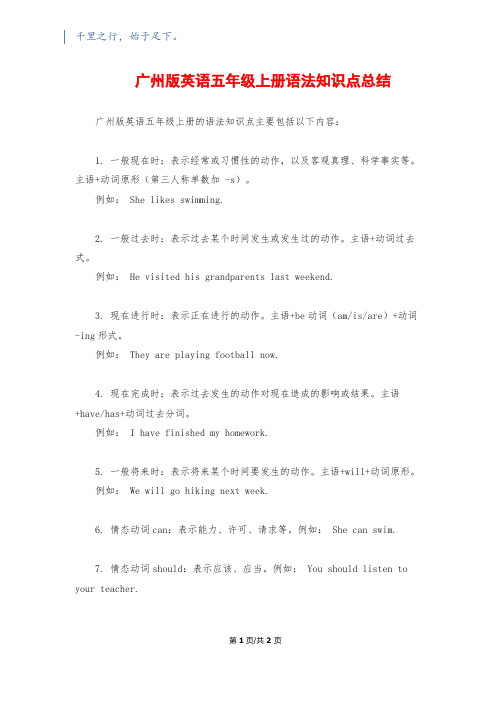
千里之行,始于足下。
广州版英语五年级上册语法知识点总结广州版英语五年级上册的语法知识点主要包括以下内容:1. 一般现在时:表示经常或习惯性的动作,以及客观真理、科学事实等。
主语+动词原形(第三人称单数加 -s)。
例如: She likes swimming.2. 一般过去时:表示过去某个时间发生或发生过的动作。
主语+动词过去式。
例如: He visited his grandparents last weekend.3. 现在进行时:表示正在进行的动作。
主语+be动词(am/is/are)+动词-ing形式。
例如: They are playing football now.4. 现在完成时:表示过去发生的动作对现在造成的影响或结果。
主语+have/has+动词过去分词。
例如: I have finished my homework.5. 一般将来时:表示将来某个时间要发生的动作。
主语+will+动词原形。
例如: We will go hiking next week.6. 情态动词can:表示能力、许可、请求等。
例如: She can swim.7. 情态动词should:表示应该、应当。
例如: You should listen to your teacher.第1页/共2页锲而不舍,金石可镂。
8. 基数词和序数词的用法。
例如: six cups,the first book。
9. 形容词的比较级和最高级形式。
例如: tall-taller-tallest,good-better-best。
10. 疑问词的用法。
例如: What's your favourite colour?11. 人称代词的主格和宾格。
例如: I like apples. Give it to me, please.12. 反意疑问句。
例如: You like Chinese food, don't you?13. 特殊疑问句。
广州版五年级英语笔记

广州版小学五年级英语知识点总结五年级上册共六个模块,18单元,209单词(四年级186个单词)五年级下册共六个模块,18单元,157单词(四年级172个单词)五年级上册知识点Module1 Routines and Dates学习重点1、掌握一月到十二月、四季的名称2、用英语说出日期日期的表示法有两种,如:“今天10月20日。
”a)先说月份:Today is October the twentieth (20th)b)先说日期:Today is the twentieth of October(20th)1、掌握节日的名称及日期。
(详见书本第13页)例如:New Year's Day( January 1st ) Women's Day( March 8th)4、能用英语说出学期的开始和结束The autumn term begins in September and ends in January.5. 掌握基数词和序数词,注意区分和运用重点掌握:first,second,third,fifth,ninth,twelfth,twentieth.基数词表示数量:three pandas三只熊猫。
序数词表示顺序:the second month第二个月6、注意表示时间频率的词:never、sometimes、often、usually、always,注意这些词在句子中的位置——除了“是”动词以外,他们都放在在动词的前面,如:(1)She often comes here . (2)She is always late .7、能用英语谈论日常的活动(能写一篇小作文)8、掌握时态:一般现在时的使用:(1)定义:一般现在时表示已形成习惯、规律的动作或状态。
(2)特征:通常句子中有often、usually、或sometimes等等。
(3)肯定句的结构:人称+动词:①其他人称(I、you、we、they、the boys……)+动词原形②第三人称单数(he、she、it、Tom、……)+动词“s/es”形式例句:The boys like TV plays. Sally likes TV plays.(4)一般疑问句:助动词(Do/Does)+人称+动词原形Do the boys like TV plays? Does the boy like TV plays?(5)否定句:人称+助动词否定形词(don’t/doesn’t)+动词原形The boys don’t like TV plays. The boy doesn’t like TV plays. (6)记住:助动词一出,后面动词用原形。
广州版五年级下册英语笔记 M4笔记
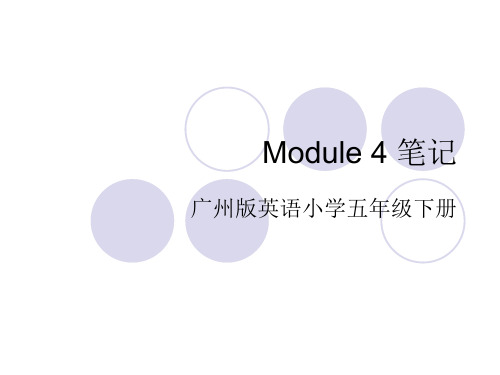
例句: 1) Our classroom is the biggest here. 2) Meihua is the tallest girl in her class. 3) Russia is the largest country in the world. 4) He runs fastest in the team.
2、谈论身高体重的句型 1) It can be 30 metres long. 2) It weighs over 150 tons. 注意的问题: 1、比较两样(种)以上的东西时副词应变化: A.hard – harder late – later high – higher fast – faster early – earlier B.well – better much – more badly – worse far – farther
Module 4 笔记
广州版英语小学五年级下册
Module 4 Wild Animals
1)能就“野生动物”的话题进行交谈; 2)能就“比较动物”的话题进行交谈。 1、掌握比较级和最高级的句型 1) Giraffes’ legs are longer than horses’ legs. (形容词比 较级) 2) Elephants are the biggest animals in the world. (形容 词最高级) 3) Deer run faster than giraffes. (副词比较级) 4) Of all animals, cheetahs run (the) fastest. (副词最高 级) 5) Who works hardest in our class? (副词最高级)
广州版五年级下册英语笔记M3笔记
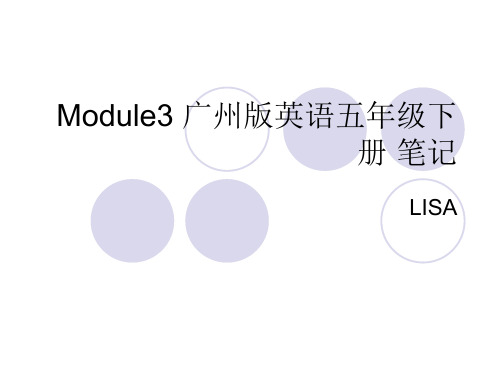
2、情态动词would及must、need的否定式 的用法及一些交际用语: 1) You needn’t go to school by bus. 2) We mustn’t pick the flowers. 3) Would you like to visit our new school? Yes, I’d love to. 4) Welcome to our school. Thank et still 用于肯定句和疑问句: He still works at Guangming Farm. Does she still study at that primary school? yet 用于否定句: They don’t start to work yet.
翻译句子:
1、谁比Jim年纪大?是你。 ________ is _________than Jim? ________ are 2、谁比David更强壮?是Gao Shan. ________ _________ than David? Gao Shan ________. 3、谁的铅笔更长,他的还是她的?我想是她的。 _________ pencil is _________,______or________? ________is,I think. 4、谁的苹果更重,你的姐姐的还是你的弟弟的? 我的 弟弟的。 ______ apples ______ ________,your _______ or your _______? My ______ _______. 5、你和你的叔叔一样高吗?是的。 _________ ________as _________as your uncle? Yes, I am.
Unit 9 far 的比较级1)farther(更远)具体的.一 般表示距离 2)further(进一步)抽象事 物 一般表示学业深造 最高级 farthest/furthest
教科版(广州版)英语五年级下册知识点总结

五年级下册知识点一、短语1. go skiing 去滑雪2. go camping 去露营3. play outside在户外玩4. fly a kite 放风筝5. make a snowman 堆雪人6. see/watch a film 看电影7. go shopping 去购物8. watch a football match 看足球比赛9. visit the museum 参观博物馆10. go mountain climbing 去爬山11. have a good time 玩得开心12. turn left/right 左转/右转13. go straight ahead 直走14. too…to 太。
以至于15. would you like…? 你愿意。
吗?16. I’d like to… 我想要。
17. get hurt 受伤害18. watch out 注意二、句型【M1】1. 问最喜欢的季节:- What’s your favourite season?- My favourite season is … .2. 问一年有多少季节:- How many seasons are there in a year?- There are four.3. 问在相应的季节做什么事:- What can you do in +季节?- I can do sth. in +season. ( e.g: I can make a snowman in winter.)4. 选择疑问句:- Do you like summer or winter?- I like summer/winter.- I don’t like summer, and I don’t like winter, either.【M2】1. 问计划或将要做什么:- What are you going to do tomorrow/this weekend…?- I am going to do sth. (+动词原形.)2. 问日期:(重点复习序数词和月份的表达)- What’s the date today?- It’s 月份+序数词. ( e.g: It’s June 1st.)3. 问星期几:- What day is it today?- It’s +星期几. ( e.g: It’s Monday.)【M3】1. 邀请:- Would you like to do sth.? (e.g: Would you like to go shopping?) - Yes, I’d like to. / That sounds great.2. 问约定时间:- What time should we meet?- At +时间.【M4】1. 问交通工具:- How do you do sth. ? / How will you get there?- By +交通工具. ( e.g: I go to school by bike.)【M5】祈使句的用法:(动词原形,don’t表示否定)1. -Do cross the street at the traffic lights or safety crossing.- Ok. / All right.2. Don’t cross the road when the traffic light is red.【M6】1. 问路:- Excuse me. Can you tell me the way to …?- Yes. Go straight ahead. Turn left/right at the second crossing.三、语法1. 一般现在时(经常做、习惯)a. 标志词:often, always, never, usually, seldom, sometimes, everyb. 形式/结构:肯定句:第一、二人称、复数+动词原形;第三人称单数+动词s/es 否定句:第一、二人称、复数+ don’t +动词原形;第三人称单数+ doesn’t +动词原形一般疑问句:Do + 第一、二人称、复数+ 动词原形+ 其他?Does + 第三人称单数+ 动词原形+ 其他?2. 一般将来时a. 标志词:tomorrow, next week/month/…, 将来时间b. 肯定句形式/结构:①主语+ will + 动词原形(e.g: I will go to school tomorrow.)②主语+ be going to +动词原形(be动词:am, are, is)e.g: She is going to go to the library this weekend.3. 一般过去时a. 标志词:yesterday, last, ago, 过去时间b. 形式:主语+ 动词过去式(一般+ed)+ 其他.1、只要朝着一个方向努力,一切都会变得得心应手。
广州版小学五年级英语知识点总结

广州版小学五年级英语知识点总结广州版小学五年级英语知识点总结五年级上册共六个模块,18单元,209单词(四年级186个单词)五年级下册共六个模块,18单元,157单词(四年级172个单词)五年级上册知识点Module1 Routines and Dates学习重点1、掌握一月到十二月、四季的名称2、用英语说出日期日期的表示法有两种,如:“今天10月20日。
”a)先说月份:Today is October the twentieth (20th)b)先说日期:Today is the twentieth of October(20th)3、掌握节日的名称及日期。
(详见书本第13页)例如:New Year's Day( January 1st ) Women's Day( March 8th)4、能用英语说出学期的开始和结束The autumn term begins in September and ends in January.5. 掌握基数词和序数词,注意区分和运用重点掌握:first,second,third,fifth,ninth,twelfth,twentieth.基数词表示数量:three pandas三只熊猫。
序数词表示顺序:the second month第二个月6、注意表示时间频率的词:never、sometimes、often、usually、always,注意这些词在句子中的位置——除了“是”动词以外,他们都放在在动词的前面,如:(1)She often comes here . (2)She is always late .7、能用英语谈论日常的活动(能写一篇小作文)He can’t skate at all .=He can not skate at all.He doesn’t like it at all .=He does not like it at all.Module 3 Plants学习重点1、能用英语说出一些植物(花,树木)的名称,并能写出十个以上有关植物的单词,并写上中文。
广州五年级英语知识点
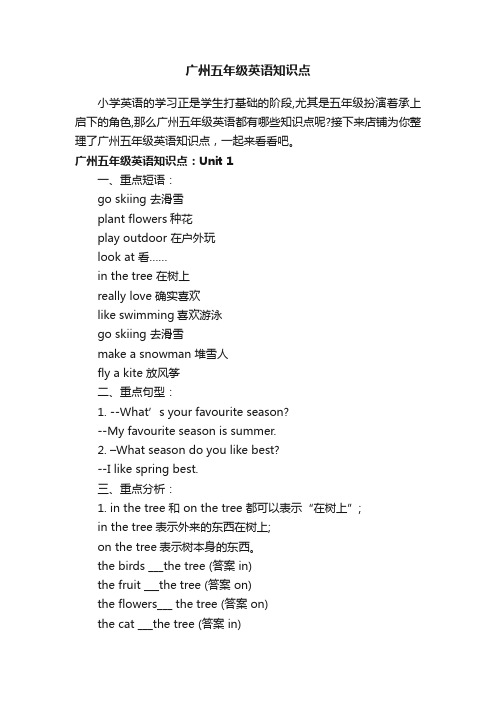
广州五年级英语知识点小学英语的学习正是学生打基础的阶段,尤其是五年级扮演着承上启下的角色,那么广州五年级英语都有哪些知识点呢?接下来店铺为你整理了广州五年级英语知识点,一起来看看吧。
广州五年级英语知识点:Unit 1一、重点短语:go skiing 去滑雪plant flowers种花play outdoor 在户外玩look at 看……in the tree 在树上really love 确实喜欢like swimming喜欢游泳go skiing 去滑雪make a snowman 堆雪人fly a kite 放风筝二、重点句型:1. --What’s your favourite season?--My favourite season is summer.2. –What season do you like best?--I like spring best.三、重点分析:1. in the tree 和 on the tree 都可以表示“在树上”;in the tree表示外来的东西在树上;on the tree表示树本身的东西。
the birds ___the tree (答案 in)the fruit ___the tree (答案 on)the flowers___ the tree (答案 on)the cat ___the tree (答案 in)2. the best time for swimming = the best time to swim[注意for 后面的动词要用ing形式,to 后面要用动词原形。
]When is the best time for visiting Beijng / to visit Beijing ?3. prefer表示对比,意思是“更喜欢;更愿意,宁愿;更倾向于…..”I don’t want to go out.I prefer to stay at home.4. either 用于否定句中,表示“也”,相当于肯定句或疑问句中的“too”。
最新广州版五年级英语笔记资料
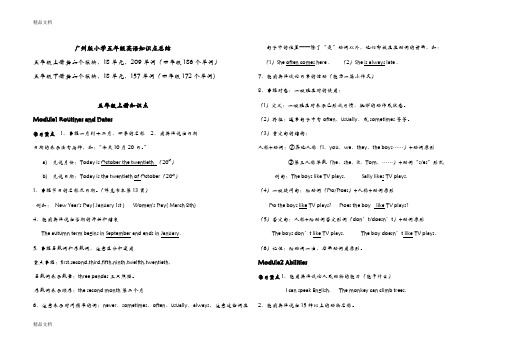
广州版小学五年级英语知识点总结五年级上册共六个模块,18单元,209单词(四年级186个单词)五年级下册共六个模块,18单元,157单词(四年级172个单词)五年级上册知识点Module1 Routines and Dates学习重点1、掌握一月到十二月、四季的名称2、用英语说出日期日期的表示法有两种,如:“今天10月20日。
”a)先说月份:Today is October the twentieth (20th)b)先说日期:Today is the twentieth of October(20th)1、掌握节日的名称及日期。
(详见书本第13页)例如:New Year's Day( January 1st ) Women's Day( March 8th)4、能用英语说出学期的开始和结束The autumn term begins in September and ends in January.5. 掌握基数词和序数词,注意区分和运用重点掌握:first,second,third,fifth,ninth,twelfth,twentieth.基数词表示数量:three pandas三只熊猫。
序数词表示顺序:the second month第二个月6、注意表示时间频率的词:never、sometimes、often、usually、always,注意这些词在句子中的位置——除了“是”动词以外,他们都放在在动词的前面,如:(1)She often comes here . (2)She is always late .7、能用英语谈论日常的活动(能写一篇小作文)8、掌握时态:一般现在时的使用:(1)定义:一般现在时表示已形成习惯、规律的动作或状态。
(2)特征:通常句子中有often、usually、或sometimes等等。
(3)肯定句的结构:人称+动词:①其他人称(I、you、we、they、the boys……)+动词原形②第三人称单数(he、she、it、Tom、……)+动词“s/es”形式例句:The boys like TV plays. Sally likes TV plays.(4)一般疑问句:助动词(Do/Does)+人称+动词原形Do the boys like TV plays? Does the boy like TV plays?(5)否定句:人称+助动词否定形词(don’t/doesn’t)+动词原形The boys don’t like TV plays. The boy doesn’t like TV plays. (6)记住:助动词一出,后面动词用原形。
广州版五年级英语知识点复习归纳

五年级第一学期英语知识点复习归纳Module1 Routines and Dates⏹1) 主要话题:⏹ A. 年, 季节, 月, 日, 时刻;⏹ B. 日常生活活动;⏹ C. 能力与可能;⏹ D. 植物;⏹ E. 动物园动物;⏹ F. 去旅游以及去旅游的方法;⏹G. 方位;⏹H. 问路与应答;⏹I. 规劝与应答⏹(1) 主要知识与技能的教学内容:⏹ A. 第三人称单数为主语的一般现在时的运用;⏹ B. 一般将来时(be going to, will)的运用;⏹ C. 序数词的使用;⏹ D. 情态动词can, must的连用;⏹ E. 介词与时间连用;⏹ F. 时间倒读法的运用.Unit1 what is our life like?有用的词组:go to school去上学come back home回家go to bed上床睡觉go shopping 去购物go for a walk 去散步take exercise 做运动do one’s homework做作业(one’s位置按人称代入)surf the Net 上网after dinner晚饭后visit the museum 参观博物馆at the weekend 在周末学习的重点难点:1.Would you like to go to school with Yongxian tomorrow?2.How often does LiHong watch TV?She watches TV every evening.Unit2 how many terms do you have in a school year?有用的词组:School year学年start in开始于end in结束于What about…? …又怎么样?Like…best最喜欢….On holiday放假,在假期中Chinese New Year 农历新年Children’s Day儿童节Teacher’s Day教师节学习的重点难点:1.It starts in September and ends in December.2.Children’s Day is on the first of June.(英式英语,先日后月)3.Children’s Day is on June first (美式英语,先说月后日)4.What date is it today?5.序数词的用法。
广州版英语五年级上册语法知识点总结
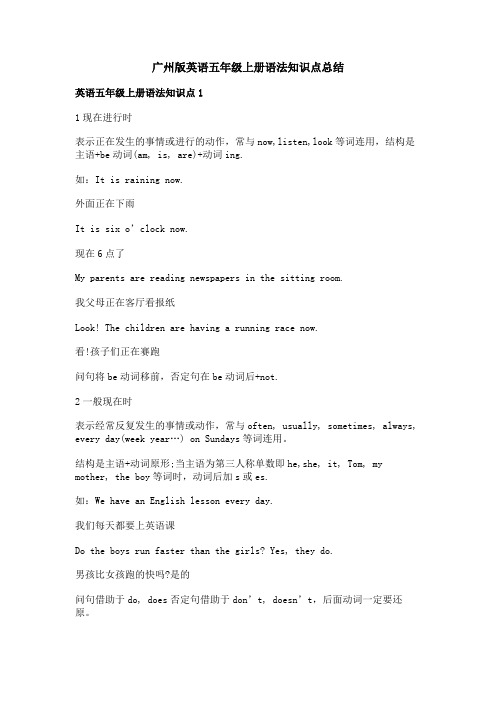
广州版英语五年级上册语法知识点总结英语五年级上册语法知识点11现在进行时表示正在发生的事情或进行的动作,常与now,listen,look等词连用,结构是主语+be动词(am, is, are)+动词ing.如:It is raining now.外面正在下雨It is six o’clock now.现在6点了My parents are reading newspapers in the sitting room.我父母正在客厅看报纸Look! The children are having a running race now.看!孩子们正在赛跑问句将be动词移前,否定句在be动词后+not.2一般现在时表示经常反复发生的事情或动作,常与often, usually, sometimes, always, every day(week year…) on Sundays等词连用。
结构是主语+动词原形;当主语为第三人称单数即he,she, it, Tom, my mother, the boy等词时,动词后加s或es.如:We have an English lesson every day.我们每天都要上英语课Do the boys run faster than the girls? Yes, they do.男孩比女孩跑的快吗?是的问句借助于do, does否定句借助于don’t, doesn’t,后面动词一定要还原。
3一般过去时表示发生在过去的事情或存在的状态,常与just now; a moment ago; … ago; yesterday; last ( week; month; year; Monday; weekend); this morning等词连用。
结构是主语+be动词的过去式(was; were)或主语+动词的过去式。
注意:be动词与动词过去式不可同时使用。
如:My earphones were on the ground just now.我的耳机刚刚还在呢。
广州版小学英语五年级下册第八单元笔记,简单版
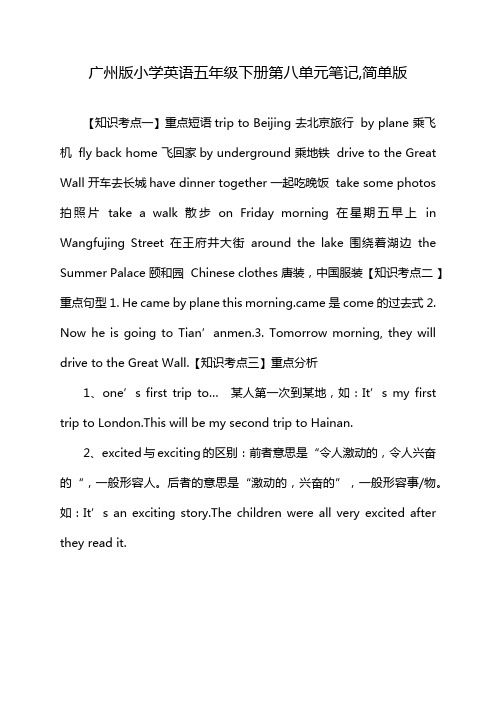
广州版小学英语五年级下册第八单元笔记,简单版
【知识考点一】重点短语trip to Beijing 去北京旅行 by plane 乘飞机 fly back home 飞回家by underground 乘地铁 drive to the Great Wall 开车去长城have dinner together 一起吃晚饭 take some photos 拍照片 take a walk 散步on Friday morning 在星期五早上 in Wangfujing Street 在王府井大街around the lake 围绕着湖边the Summer Palace 颐和园 Chinese clothes 唐装,中国服装【知识考点二】重点句型1. He came by plane this morning.came是come的过去式2. Now he is going to Tian’anmen.3. Tomorrow morning, they will drive to the Great Wall.【知识考点三】重点分析
1、one’s first trip to…某人第一次到某地,如:It’s my first trip to London.This will be my second trip to Hainan.
2、excited与exciting的区别:前者意思是“令人激动的,令人兴奋的“,一般形容人。
后者的意思是“激动的,兴奋的”,一般形容事/物。
如:It’s an exciting story.The children were all very excited after they read it.。
广州版五年级上下册英语知识点总结.doc
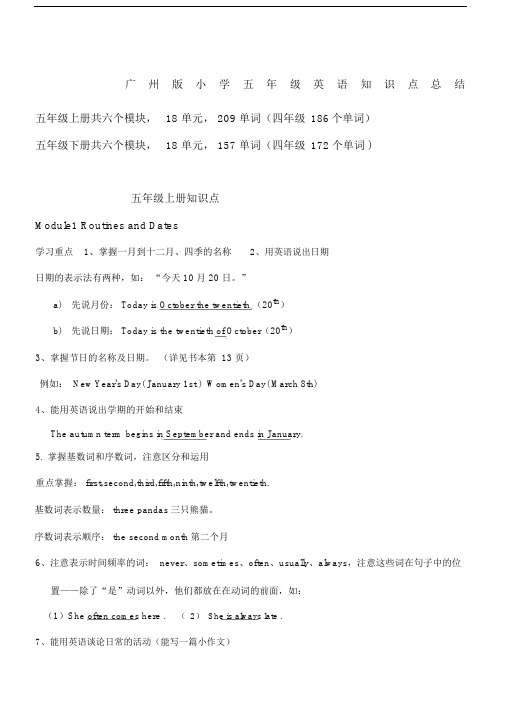
广州版小学五年级英语知识点总结五年级上册共六个模块,18 单元, 209 单词(四年级186个单词)五年级下册共六个模块,18 单元, 157 单词(四年级172个单词 )五年级上册知识点Module1 Routines and Dates学习重点1、掌握一月到十二月、四季的名称2、用英语说出日期日期的表示法有两种,如:“今天 10 月 20 日。
”a)先说月份: Today is October the twentieth (20th)b)先说日期: Today is the twentieth of October(20th)3、掌握节日的名称及日期。
(详见书本第 13 页)例如: New Year's Day( January 1st ) Women's Day( March 8th)4、能用英语说出学期的开始和结束The autumn term begins in September and ends in January.5.掌握基数词和序数词,注意区分和运用重点掌握: first,second,third,fifth,ninth,twelfth,twentieth.基数词表示数量: three pandas三只熊猫。
序数词表示顺序: the second month第二个月6、注意表示时间频率的词: never、sometimes、often、usually、always,注意这些词在句子中的位置——除了“是”动词以外,他们都放在在动词的前面,如:(1)She often comes here .(2)She is always late .7、能用英语谈论日常的活动(能写一篇小作文)8、掌握:一般在的使用:(1)定:一般在表示已形成、律的作或状。
(2)特征:通常句子中有often、 usually、或 sometimes等等。
(3)肯定句的构:人称 +:①其他人称( I、you、we、they、 the boys⋯⋯) +原形②第三人称数( he、she、it 、Tom、⋯⋯) +“ s/es”形式例句: The boys like TV plays.Sally likes TV plays.(4)一般疑句:助(Do/Does)+人称 +原形Do the boys like TV plays? Does the boy like TV plays?(5)否定句:人称 +助否定形( don’ t/doesn’ t)+原形The boys don’ t like TV plays.The boy doesn’t like TV plays.(6)住:助一出,后面用原形。
广州版五年级下册英语笔记unit4 unit5 M2笔记

5、take the medicine three times a day 一天服药 三次 6、take long 花很多时间 7、Never too much of good food. 好的东西也不 能吃太多。 8、airsick 晕机 backache 背疼 earache 耳疼 hurt 伤;疼得
checkup给某人检查身体3plenty大量的可修饰可数或不可数名词basket4walklot走很多路lot吃很多东西5takemedicinethreetimesday一天服药三次6takelong花很多时间7nevertoomuchgoodfood
广州版五年级下册
英语笔记
Module 2 Seeing a Doctor
2、生活用语: 1) It’s time to get up. 2) I don’t want to be late for school. 注意的问题: 1、注意一些合成词的构成 以前学过合成词,如:football chalkboard bedroom 本模块出现的合成词:-ache head – headache tooth – toothache stomach – stomachache 2、有情态动词should的句子的肯定式、否定式和一般疑问 式: We should get there before eight. We shouldn’t (should not) get there too late. Should we get there before nine?
Unit 4
1、It’s time to…与 It’s time for…的区别: It’s time for bed /class/school/breakfast/lunch/dinner.(for后加名 词) It’s time to go to bed/school/have breakfast/have lunch/have dinner. (to后加动词) 2、联系动词fell / look / get/ become等后可以加 形容词,例如: I feel tired / hot / cold / hungry. He looks tired / he matter? / What’s the matter with you? 2、give s.b. a checkup 给(某人)检查身体 3、plenty of 大量的 (可修饰可数或不可数名词) There is plenty of water. There are plenty of eggs in the basket. 4、walk a lot 走很多路 eat a lot 吃很多东西
教科版(广州)英语五年级下册全册知识点归纳

教科版五年级下册基础知识汇总Unit !What's your favourite season?【重点单词】1.colourful多彩的 5.ski滑雪2.winter冬天 6.plant种植;植物3.either也7.camp野营:营地4.autumn秋天8.prefer选择,宁愿要【重点短语】I.go skiing去滑雪7.in the trees在树上2.plant flowers丰中花8.favourite season最喜欢的季节3.play outdoors在户外玩耍9.too hot太热4.go camping去野营10.make a snowman堆雪人5.colourful flowers多彩的花11.fly a kite放风筝6.beautiful birds 漂亮的鸟12.eat ice cream吃冰激凌【重点句子】1.-What’s your favourite season,Ben?本,你最喜玫什么季节?-Summer.夏天。
I)此问句用于湖问对方最喜欢付么季节。
2)答语为“(My favourite season is十)季节名称.”。
3)其中your是形容词性物主代词,意为“你的:你们的”。
4 )fav omite的意思是“最喜欢的”。
例如:-What’s your 臼vomite season, Mike?迈克,你最喜欢什么季节?-Winter.冬天。
2.1 love swimming and summer is the best time for swimming.我喜欢游泳,夏天是游泳最好的时候。
l)Ei11:t称十比川巳st time for+t9J词叫形式(十其他)明来描述某季节是做某活动最好的时候。
2)其中best意为“最好的”。
3)for是介词,后接动词ing形式。
例如:Winter is the best time for skiing.冬天是泪’雪最好的时候。
- 1、下载文档前请自行甄别文档内容的完整性,平台不提供额外的编辑、内容补充、找答案等附加服务。
- 2、"仅部分预览"的文档,不可在线预览部分如存在完整性等问题,可反馈申请退款(可完整预览的文档不适用该条件!)。
- 3、如文档侵犯您的权益,请联系客服反馈,我们会尽快为您处理(人工客服工作时间:9:00-18:30)。
广州版小学五年级英语知识点总结五年级上册共六个模块,18单元,209单词(四年级186个单词)五年级下册共六个模块,18单元,157单词(四年级172个单词)五年级上册知识点Module1 Routines and Dates学习重点1、掌握一月到十二月、四季的名称2、用英语说出日期日期的表示法有两种,如:“今天10月20日。
”a)先说月份:Today is October the twentieth (20th)b)先说日期:Today is the twentieth of October(20th)1、掌握节日的名称及日期。
(详见书本第13页)例如:New Year's Day( January 1st ) Women's Day( March 8th)4、能用英语说出学期的开始和结束The autumn term begins in September and ends in January.5. 掌握基数词和序数词,注意区分和运用重点掌握:first,second,third,fifth,ninth,twelfth,twentieth.基数词表示数量:three pandas三只熊猫。
序数词表示顺序:the second month第二个月6、注意表示时间频率的词:never、sometimes、often、usually、always,注意这些词在句子中的位置——除了“是”动词以外,他们都放在在动词的前面,如:(1)She often comes here . (2)She is always late .7、能用英语谈论日常的活动(能写一篇小作文)8、掌握时态:一般现在时的使用:(1)定义:一般现在时表示已形成习惯、规律的动作或状态。
(2)特征:通常句子中有often、usually、或sometimes等等。
(3)肯定句的结构:人称+动词:①其他人称(I、you、we、they、the boys……)+动词原形②第三人称单数(he、she、it、Tom、……)+动词“s/es”形式例句:The boys like TV plays. Sally likes TV plays.(4)一般疑问句:助动词(Do/Does)+人称+动词原形Do the boys like TV plays? Does the boy like TV plays?(5)否定句:人称+助动词否定形词(don’t/doesn’t)+动词原形The boys don’t like TV plays. The boy doesn’t like TV plays. (6)记住:助动词一出,后面动词用原形。
Module2 Abilities学习重点1、能用英语谈论人或动物的能力(能干什么)I can speak English. The monkey can climb trees.2、能用英语说出15种以上的动物名称。
3、句子有“can”的时候,无论人称是谁,一般现在时的动词在肯定句,否定句或一般疑问句一律用原形,如:I/You/He/They/My mother can sing. Can you/he/they/my mother sing?I/You/He/They/My mother can’t sing.4、注意“everyone”作为单数用: Everyone is here. Everyone likes flowers.5、注意“not…at all”的使用:He can’t skate at all .=He can not skate at all.He doesn’t like it at all .=He does not like it at all.Module 3 Plants学习重点1、能用英语说出一些植物(花,树木)的名称,并能写出十个以上有关植物的单词,并写上中文。
2、注意must和mustn’t的使用(1)must必须mustn’t禁止、不允许(2)must/ mustn’t后面的动词用原形,例如:I must go我必须走了。
We mustn’t pick flowers in the park. 我们不能在公园里在摘花。
3、掌握Can开头表示请求的句子的回答。
如:---Can I go with you? ---Sure./ Of course you can.Module4 Travel学习重点1、能说出十种以上的日常交通工具,并写上中文。
2、注意使用交通工具的表示方法。
by(乘坐):by bus/by train/by spaceship 等, on foot(步行、走路)3、时间的表达方有两种,一种是直接表达法,直接按照“小时+分钟”的顺序读出时间,7:15-seven fifteen 7:30-seven thirty 第二种是逆读法,基本按照“分钟+小时”顺序读出时间,如:①用past(在半小时之内,包括半小时),如:7:10-ten past seven 6:15-a quarter past six 9:25-twenty five past nine②半小时用half past, 如: 7:30-half past seven③用to(超过半小时).读作“相差的分钟+to+下一个小时”,如: 7:45-a quarter to eight4、介词的使用in、on、at在时间前的用法.at-具体几点钟,如: at five o'clock (习惯用法:at the weekend)on-具体某一天,星期、日期前用,如: on Sunday,on May 1st, on weekdaysin-早上、下午、晚上, 如:in the morning /in the afternoon /in the evening in-年份、月份、季节前使用,如:in November月份in winter季节in 2005年份5. 掌握时态:一般将来时态:表示将要发生的事情.1)…be ( is \ am \are ) going to…动词原形.例如:表示某人将要去游泳I am going to swim. You are going to swim. She is going to swim.2)…Will …+ 动词原形.例如:表示某人将要去游泳I will swim. You will swim. She will swim.Module 5 Zoo Animals学习重点1、能用英语说出十五种以上动物的名称,并写上中文。
2、能用英语说出一些地方(如各大洲)的名称,并知道它们的位置。
3、当我们想要提出请求或征询意见的时候,我们可以用“Would you like to + 动词原形”的结构Would you like to go shopping with me?Would you like to water the flowers?Would you like to have lunch with my family?回答:Yes, I’d love to./ Yes, of course.4、当你看到不良行为时,能用英语进行规劝,请写出5个以上。
(详见书本61页和90页)例如:Don't kill us. Don't wake up a lion.Module 6 Directions学习重点1、能用英语说出一些公共建筑物和学校建筑的名称。
2、能用英语问路,如:1)Where is the canteen, please? 2)Could you tell me the way to the canteen, please? 3)Could you tell me how to get to the canteen, please? 4)How do I get to the canteen, please?5)Is the canteen near here? 6)Is the zoo on the right or on the left?3、能用英语回答某地的位置,并记住以下的一些表达方式:turn right out of the hotel 在宾馆外面on the left / right 在左边/ 在右边turn left / right 转左/ 转右go straight ahead 一直往前走take the second left 在第二个拐弯处左拐take a No.216 bus 乘坐216号公共汽车4、注意询问别人或道谢的礼貌用语,如:(1)Thank you very much./ Thanks a lot.两句都可以回答:You’re welcome./ Not at all.(2) Excuse me. (用于打扰别人的时候。
)五年级第一学期英语语法资料一、名词复数的构成方法:1.一般直接在词尾加上“s”(book—books)2.以x. s .ch .sh结尾的直接加上“es”(box—boxes , dress—dresses)3.单.复数同形: fish , sheep .4.大多数以f(fe)结尾的,变f(fe)为v再加上“es”.(knife—knives shelf—shelves)5.以y结尾的,y前是元音字母的直接加上“s”(boy—boys ); y前是辅音字母的变y为i 再加上“es”(factory—factories)。
